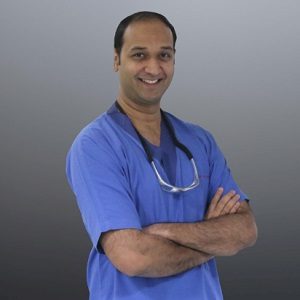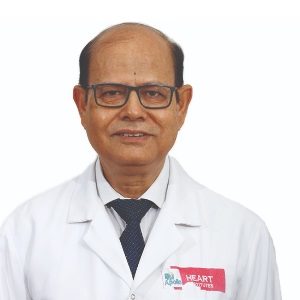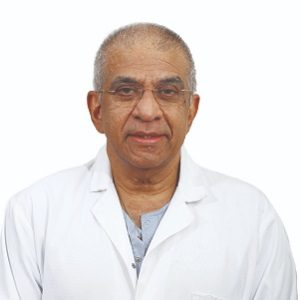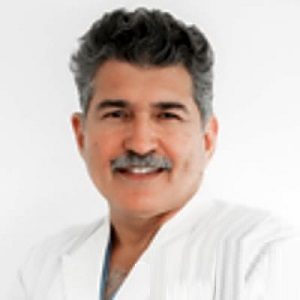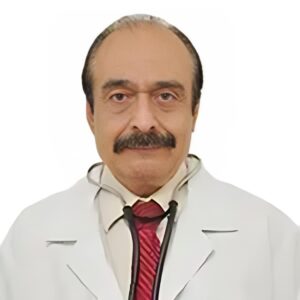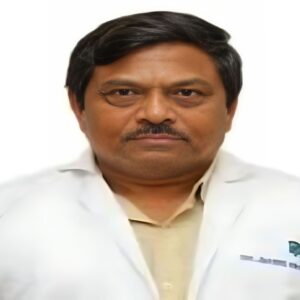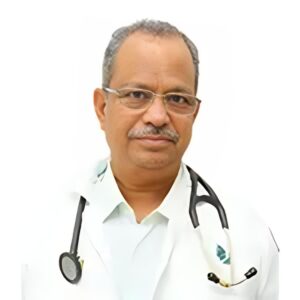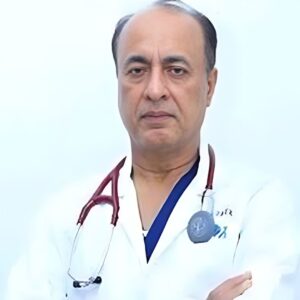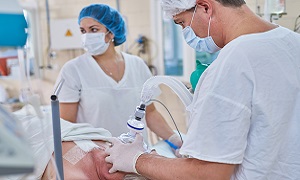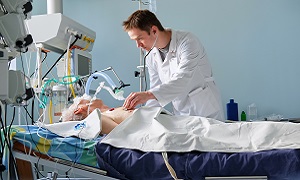Best Doctors in India for Aortic Valve Repair / Replacement
- Interventional Cardiologist, Chennai, India
- Over 15 years’ experience
- Apollo Hospitals Greams Road
Profile Highlights:
- Dr. Sai Satish is a distinguished Senior Interventional Cardiologist affiliated with Apollo Hospitals in India, renowned for his pioneering contributions to the field of transcatheter valve therapies.
- His expertise extends internationally, as he also serves as a practicing interventional cardiologist and esteemed faculty member at the Gottsegen Institute of Cardiology in Budapest, Hungary, one of the world’s leading centers for TAVR (transcatheter aortic valve replacement) training.
- A trailblazer in the realm of minimally invasive cardiovascular procedures, Dr. Satish is celebrated for performing the highest number of percutaneous edge-to-edge mitral repairs (MitraClip implants) in the Indian subcontinent.
- Cardiac Surgeon, Cardiothoracic Surgeon, Vascular Surgeon, Chennai, India
- Over 35 years’ experience
- Apollo Hospitals Greams Road
Profile Highlights:
- Dr. Dillip Kumar Mishra is a well-known and experienced Cardiothoracic Surgeon in Chennai who has completed 35 years of specialized experience.
- The doctor gained experience working overseas in countries like Italy, Saudi Arabia, Bangladesh-Dhaka, and India.
- The doctor offers the best services to the patients, some of the prominent services include Intra – Arterial Thrombolysis, Mitral/Heart Valve Replacement, Cardio-Thoracic Surgery, bypass surgery, Radial Approach Angiography Balloon Mitral Valvuloplasty, etc.
- Cardiac Surgeon, Cardiothoracic Surgeon, Vascular Surgeon, Chennai, India
- Over 31 years’ experience
- Apollo Hospitals Greams Road
Profile Highlights:
- Dr. Vijay Shankar S is a senior cardio-thoracic Surgeon in Chennai having experience of more than 30 years in Cardiac Surgery.
- Dr. Vijay Shankar was a fellow Coronary Artery Surgery and Congenital Heart Surgery at the University of Wisconsin, USA.
- He provides consultation and diagnostic services for Mitral/Heart Valve Replacement, Cardiac Pacing, Invasive Cardiology, ABPM, Balloon Mitral Valvuloplasty, CT Angiography, etc.
- Cardiovascular Surgeon, Cardiac Surgeon, Gurugram, India
- Over 32 years’ experience
- Medanta-The Medicity, Gurgaon
Profile Highlights:
- Dr. Vijay Kohli is one of the best cardiac surgeons in India. He has brought an evolution in the spectra of Cardiac Surgery, wherein, he was the first leading surgeon to perform CABG on a beating heart in Kathmandu, Nepal.
- Vijay Kohli performed the first coronary artery bypass surgery in Jammu Medical College in 2001.
- Cardiologist
- Over 52 Years Experience
- Apollo Hyderabad
Profile Highlights:
- Dr. Sudhir Naik is a top cardiologist in Hyderabad and is among the most experienced doctors in the field.
- As a Senior Consultant of Cardiology at Apollo Health City, Hyderabad, Dr. Naik brings a plethora of experience to his profession.
- With an experience of over 52 years, Dr. Sudhir Naik stands as a well-renowned specialist who provides a range of treatments to address a variety of issues related to cardiology.
- Committed to providing complete cardiac care, Dr. Sudhir Naik specializes in treating ailments like chest pain, heart failure, hypertension, coronary artery disease, arrhythmia, etc.
- He is quite efficient in performing complex procedures like TAVR (Transcatheter Aortic Valve Replacement) and high-risk procedures like angioplasties.
- In addition to his clinical expertise, Dr. Sudhir Naik also stands as a prolific researcher. He has contributed to many national and international journals, demonstrating his dedication to the advancement of cardiac science.
- Cardiologist, Hyderabad, India
- Over 36 Years Experience
- Apollo Hyderabad
Profile Highlights:
- Dr. Badri Narayana Tumulu is one of the finest cardiologists in Hyderabad, with an extensive experience of over 36 years in the clinical field of Cardiology. Currently, Dr. Tumulu serves as a Senior Consultant in the department of Cardiology at Apollo Hospitals, Hyderabad.
- Dr. Tumulu’s commitment to improving cardiac care is seen by his work in cardiovascular disease management, preoperative care, and preventive measures.
- He brings forth a plethora of expertise and knowledge into his practice and treats a wide range of cardiac conditions including, Irregular Heartbeat, Dilated Cardiomyopathy, Barth Syndrome, Orthostatic Hypotension, Rheumatic Heart Disease, and much more. He also conducts multiple tests for coronary artery disease and valvular heart diseases.
- Additionally, he gives specialized treatment for chest pain that occurs during exercise, and also offers cardiac rehabilitation programmes.
- Dr. Badri Narayana Tumulu’s educational background is equally impressive as he holds various degrees such as MBBS, MD (Medicine), and DM (Cardiology). Apart from that, he is also known to contribute extensively on research papers on hypertension, women’s heart diseases, etc.
- Throughout his distinguished career, Dr. Tumulu has received several honors, such as the Mega Excellency Award (2016), the National Integration Award (2016), and the esteemed Navaratna Award (2016). In addition, he is the Founder and Chairperson of the BASE Vision Foundation (BVF), which validates his dedication to community service and high-quality healthcare.
- By maintaining his unrelenting dedication to perfection, Dr. Badri Narayana Tumulu keeps raising the bar in the field of Cardiology and making sure his patients have the best possible heart health.
- Cardiologist, Hyderabad, India
- Over 40 Years Experience
- Apollo Hyderabad
Profile Highlights:
- Dr. Venkata Rayudu Nekkanti is one of Hyderabad’s most experienced cardiologists, having been practiced for over 40 years.
- Presently practicing as a Senior Consultant in the Dept. of Cardiology at the Apollo Health City, Hyderabad, Dr. Nekkanti offers his patients with unmatched attention and care.
- He specializes in treating many cardiac disorders such as Heart Failure, Aortic Aneurysm, Hypertension, Myocardial Infarction (Heart Attack), and Coronary/Peripheral Artery Disease among several others.
- Dr. Nekkanti is also well known for his expertise in performing complicated and high-risk procedures such as Coronary Stent Implantation, Pacemaker, Implantable Cardioverter Defibrillator (ICD) implantations, and Angioplasties.
- Throughout his illustrious career, Dr. Nekkanti has received several honors, including the esteemed Govt. of Andhra Pradesh’s Best Service Award for pioneering the first Coronary Angioplasty in India.
- In addition, the Indian Academy of Echocardiography awarded him the Best Paper Award, and the Indian Society of Echo Cardiography honored him for his outstanding research on Complex Aortic Plaques in Cryptogenic Stroke in 2011.
- Due to his extensive training, kind demeanor, and commitment to promoting heart health and well-being, patients trust him and feel at ease with him.
- Cardiologist, Hyderabad, India
- Over 35 Years Experience
- Apollo Hyderabad
Profile Highlights:
- With more than 35 years of experience, Dr. Pratap Chandra Rath is one of Hyderabad’s leading cardiologists.
- Dr. Pratap Chandra Rath extends his expertise as a Senior Consultant Cardiologist & Director of Interventional Cardiology at Apollo Health City, Hyderabad where he provides comprehensive services to address a variety of cardiology disorders like Barth Syndrome, Dilated Cardiomyopathy, Irregular Heartbeat, Orthostatic Hypotension, Patent foramen ovale, and many more.
- His areas of expertise are lies in complex, high-risk angioplasties and image-guided techniques such as OCT/IVUS.
- Over the course of his career, Dr. Rath has performed over 100,000 Angiograms, 50,000 PTCA and Stenting, 200 Percutaneous Trans Myocardial Laser Revascularizations (PTMR), 5,000 Valvuloplasties, and 1,000 peripheral, renal, and carotid interventions—including ASD and PDA closures.
- Apart from his medical excellence, Dr. Pratap Chandra Rath has also achieved several groundbreaking accomplishments. In 1994, he became the first person in the Asia Pacific area to execute TransRadial Coronary Angioplasty and stenting; this achievement was recorded in the Indian Heart Journal and the Limca Book of World Records. According to the Indian Heart Journal, he was also the first in India to do venous graft operation with a protective device.
Best Hospitals in India for Aortic Valve Repair and Replacement
Aortic Valve Replacement
Purpose
There are several types of valve diseases for which aortic valve replacement might be considered. Some of them include:
Aortic valve regurgitation- This condition is known to occur when your blood flows backward through your aortic valve into the left ventricle each time the ventricle relaxes. Normally, blood is supposed to flow in one-way direction from the ventricle to the aorta. A dysfunctional or a leaky valve can lead to the backflow. This may be due to the valve deteriorating, an abnormal valve shape present at birth or due to an infection.
Aortic valve stenosis- The stenosis can lead an aortic valve to become narrowed or obstructed, which can make it even more difficult for the heart to pump blood into the aorta. This may be caused by multiple factors, such as congenital heart disease, thickening of the valve’s closure flaps or post-inflammatory changes, such as those which are associated with rheumatic heart disease.
Congenital heart disease- This can contribute to either aortic valve regurgitation or stenosis. It can also result in other problems that can prevent the proper functioning of the aortic valve. For example, a person might be born with an aortic valve not having enough tissue flaps or there may not be an opening in the valve to allow normal blood flow. The valve can also be of the wrong shape of size.
For some people who are having mild aortic valve disease without any symptoms, careful monitoring under an experienced doctor’s supervision might be all that is required.
However, in many cases aortic valve disease and dysfunction can worsen over time despite medical treatment. Most aortic valve conditions are mechanical problems that are not treatable with medications alone. Such conditions can eventually require surgery for reducing symptoms.
Your doctor and healthcare team will decide whether to go for repair or replacing the heart valve. It can depend on various factors, such as the severity of your aortic valve disease, your age and overall health or whether you require any heart surgery for any additional heart problem.
Preparation
Before you undergo the surgery for having your aortic valve repaired or replaced, your doctor and treatment team will be explaining what you can expect before, during and after your surgery as well as the potential risks the surgery may cause.
You need to discuss with your doctor and the treatment team any questions you might have about your procedure.
Before you are admitted to the hospital for your surgery, talk to your caregivers about your hospital stay and discuss any help you may require when you return home.
Also remember to talk to your doctor about when you can resume taking your medications regularly and whether you will be able to take them before your surgery. Also, ask whether you should stop eating or drinking the night before the surgery. You may also need to bring several items to the hospital including a list of your medications, eyeglasses, hearing aids, etc.
Procedure
For the aortic valve replacement procedure, you will be receiving anesthetics so that you will not be feeling any pain. You will be unconscious during the procedure.
You will be connected to a heart-lung bypass machine, which will keep your blood moving through your body during the procedure.
First, your doctor will be removing the aortic valve and replacing it with a mechanical valve or a valve made from a pig, cow or human heart tissue (valve).
Often biological tissue valves eventually need replacement as they degenerate over time. If you have a mechanical valve, you will require blood-thinning medications for the rest of your life for preventing blood clots. Doctors will be discussing with you the risks as well as the benefits of each type of valve and discuss which valve is appropriate for you.
The surgery can be performed through traditional open-heart surgery or minimally invasive methods. It involves smaller incisions than those used in open-heart surgery. There is another type of minimally invasive aortic valve replacement which is known as transcatheter aortic valve replacement.
However, minimally invasive aortic valve replacement is generally less common since not all situations are best addressed by this method of access to the damaged valve. Results similar to those with traditional open-heart surgery can be achieved if it is performed by experienced surgeons.
After the procedure
If you had open-heart surgery, you will generally require spending a day or more in the ICU. You will receive oxygen, fluids, medications as well as nutrition through the intensive care unit. Other tubes will be draining urine from your bladder, draining fluid and blood from your chest.
Later you’ll be moved to a regular hospital room where you will need to spend some days. The amount of time you will spend in the ICU and hospital may vary depending on your condition and procedure.
During your stay at the hospital, your treatment team will be watching for signs of infection in your incision sites. They will also be checking your blood pressure, breathing and heart rate periodically. If you experience pain after the surgery, they will be working with you in managing it.
Your doctor might also advise you to avoid driving a car or lifting anything more than 10 pounds for a few weeks.
Risks
There are certain risks associated with aortic valve replacement. The type of procedure and the expertise of your health care team also plays a role.
Although most people do well during this surgery, it might lead to a few problems, which include:
- Bleeding after surgery
- Infection
- Blood clots
- Heart rhythm getting thrown off for a while
- Kidney problems that can last for multiple days after surgery
- Stroke
- New valve not functioning or wearing out over time
Although rare death can also occur in a few cases. To minimize risk it is recommended that the surgery is performed by an experienced team of qualified doctors.
Aortic Valve Replacement & Aortic Valve Repair
Aortic valve repair and aortic valve replacement are procedures that treat diseases affecting the aortic valve. Types of Aortic Valve Surgery are:
- An annuloplasty is a procedure to tighten or reinforce the ring around a valve in the heart.
- A valvuloplasty, also known as balloon valvuloplasty or balloon valvotomy, is a procedure to repair a heart valve that has a narrowed opening.
Open Heart surgery versus Catheter method of Heart Replacement
Traditionally, all valve replacement procedures required a open-heart surgery. However, recent advances in catheter methods have resulted in the development of catheter- based (non-surgical) heart valve replacement procedures.
The Catheter based approach to Valve Repair is generally recommended in case of Valve Stenosis (condition in which the valve narrows down).The procedure is called Transaortic Valve Implantation/ Replacement (TAVI/TAVR) for Aortic Valve Repair. In case of Mitral Valve Repair, it is called Transaortic Mirtral Valve Implantation/ Replacement (TMVI/R).
TAVI / TMVI is the first line of treatment in cases of Valve narrowing /stenosis.
The advantage of TAVI/TMVR is that in this procedure, the valve is replaced with no scar (unlike surgery) and recovery time is minimal.
However, in cases of Valve Regurgiation (leakage), surgery is still required / recommended.

